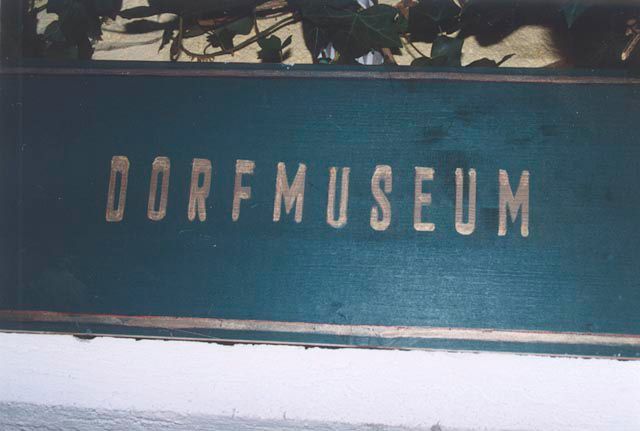First Round
BackArtists
- With
Information
The Etsdorf Kultur und Wirtschaft Kunstverein (Culture and Commerce Arts Society) launched a series of projects drawing from the specific situation of the nine Etsdorf-Haitzendorf communities in collaboration with the Lower Austrian culture department, Kunst im öffentlichen Raum. The concept envisaged providing the invited artists with region-wide possibilities to react to the different communities within the area as a historic, social or other constellation. The participating artists engaged with the many layers of the local structures in different ways, whereby the challenge in the situation for them lay in finding their work in another context, i.e. to see it exposed, as in a clearly defined art space (Daschner, Jermolaewa, Gangl). Some of the artworks, though, could only be the result of the specific situation (Theuretzbacher, Deutschbauer, Baumüller/Hofmann). The artists found approaches and forms to realise their projects that showed almost the full spectrum of what is today seen as a progressive strategy for art in public space.
Contributors
- Kuration
Contributions
Patrick Baumüller, Severin Hofmann
“Sommerloch 2000 (Summer Gap 2000)”
Patrick Baumüller and Severin Hofmann created exemplary model situations with which they approached everyday life. Their starting point was a realism as spectacular as it is banal. The first sensational view – as here in a faked car crash in a shooting range stemming from the Nazi era – produces various links which can be deconstructed for further analysis as elements and models of the
A&B
without title
The project by the group of artists A/B could not be realised due to a copyright issue, and so remains as a fragment (Dorfmuseum Etsdorf).
Katrina Daschner
without title
Katrina Daschner stages narratives in the complex compositions of her images that go beyond role-playing and gender identification. She imagined a world of beauty and irritation, one also of nightmarish associations with crime and sexual violation. In the images of roles the artist showed the construction of identities and cultural attribution. Katrina Daschner searched with relish for boundaries, the place of paucity, to recreate herself repeatedly as subject.
Julius Deutschbauer
"Bibliothek der ungelesenen Bücher" (The Library of Unread Books)
In his posters Julius Deutschbauer shows himself in various roles. He has often alluded to a cultural or political event, which he encountered in different costumes with a particular reproving pathos. In Etsdorf, dressed as a 'gendarme' he asked local residents for proverbs and sayings, for everyday words of wisdom, which he stuck onto his posters like a collection of folklore and distributed around the village. A 'Lesen und Handarbeiten im Zirkel' (Round of Reading and Handicrafts) was held in the Weinkeller Franz Wittmann as part of his 'Bibliothek der ungelesenen Bücher' series.
Sonja Gangl
"Rebeka"
Sonja Gangl presents her fictive company 'Rebeka' between the art market and commerce: a highly detailed system that analysed and reproduced the mechanisms of presentation and methods employed by commerce. The mobile Headquarters, then in Etsdorf, showed the speed with which the forces of production can be substituted in new-liberal economic structures. Rebeka introduced itself as an enterprise with a billboard and in a brochure, advertising with brownies from a local bakery (Bäckerei Braun) with an all-encompassing corporate identity.
Anna Jermolajewa
without title
Anna Jermolaewa used clockwork toys for her photographs and videos. What looks comical at first glance, incidental or familiar, and transports subliminal East-West clichés, does in fact make a precise statement due to the unambiguous setting of the artwork. In Engabrunn she placed an image between the church and the kindergarten, and a kennel with video at the beginning of Walkersdorf. The apparent levity of the objects tips with the composition in almost oppressive close-up, the initial joke froze and got lost in the opposite significance.
Engelbert Theuretzbacher
"Familienalbum aus dem Umfeld Stalag 17B"(Family Album for the surroundings of Stalag 17B)
In collaboration with a number of pupils taking the polytechnic course at Etsdorf HS, Engelbert Theuretzbacher used family photographs and texts written by the pupils to begin a project documenting the Nazi era. Their research led them to develop a shared interest in the Stalag 17B penal camp, the current state of which and the problems of years' of having been a taboo theme were the subject of the video. Various eye-witnesses were also interviewed on the topic.

